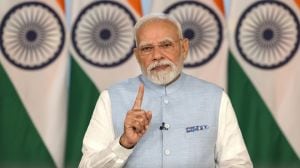Nehru’s frustrations with Panchsheel in rare tape
‘‘There is a strong sense of national spirit in India. We are left with no small flags in the country. So this is a good thing to ...

‘‘There is a strong sense of national spirit in India. We are left with no small flags in the country. So this is a good thing to happen to our country, though the price has been high.’’
The year was 1962. And it was Prime Minister Jawaharlal Nehru, speaking to a young Indian reporter from Kenya.
The history talking.com, an online oral history of the South Asian diasporas, run by a non-profit-making organisation has come across a rare interview of India’s first PM, given to a Kenyan journalist of Indian origin during the Chinese war of 1962.
Four decades later, at his house in Hayes, a small town on the western outskirts of London, Chaman Lal Chaman still remembers how it happened as he dusts off the tapes of the conversation. The India-China war was on and there was hardly any news about it in east Africa where thousands of NRIs lived. ‘‘Within 24 hours, I was put on a BOAC flight from Nairobi to New Delhi,’’ Chaman, who later became director of Asian broadcasts in the Voice of Kenya, remembers.
Chaman started reporting about the national mood. After collecting soundbytes he would rush to the AIR studios and would record his report. These reports were then put on a flight to Nairobi. Chaman sent a request to interview the PM, knowing well it was virtually impossible. But he got a call from the PMO. The next morning Chaman arrived at Nehru’s residence, Teen Murti House. ‘‘I had heard a lot about his radiance but he looked old and tired.’’
Chaman’s interview is a remarkably transparent testament of Nehru’s frustration and sadness. But he never skipped a chance to inspire his people. ‘‘First of all, I will advise people to throw out this fear from their hearts. They have to be ready for every situation. If you are afraid, your strength declines,’’ he told Chaman. Nehru acknowledged that China was a powerful country (zabardast mulk). ‘‘We don’t want to fight or defeat China, we want to keep every part of India in our possession, what ever time it takes,’’ he said.
But the feeling of betrayal of a country which he believed was a friend was rippling in Nehru’s voice. When Chaman asked him to throw light on the future of the Panchsheel, Nehru sounded slightly irritated: ‘‘Throwing light is now difficult, as the Chinese have spread darkness all over. (He laughs faintly and rather nervously). How can I throw light on Panchsheel? (He sounds irritated) By this war they have totally acted against the spirit of Panchsheel… If the Chinese don’t want to follow Panchsheel, it’s finished.’’
After a week in New Delhi, when Chaman landed in Nairobi, he was driven straight to the City Hall. ‘‘I was given a hero’s welcome. I told the waiting crowds that India needed resources to fight this war. There was an instant rush.”
Photos





- 01
- 02
- 03
- 04
- 05

























